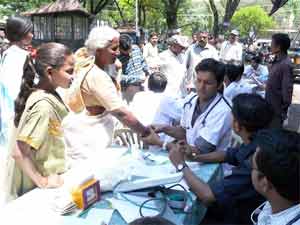
Bangalore, November 19: Most private medical colleges in Karnataka ‘buy’ patients. This startling revelation has been made by state medical education minister SA Ramadas himself.
In fact, the ‘buying’ of patients was one of the major issues discussed at a conference of health and medical education ministers held in Delhi on November 1 and 2. As per an observation made by Ramadas, most medical college hospitals bring fake patients to hospitals and ‘admit’ them to present before the committee sent by the Medical Council of India (MCI) for annual inspection.
“The colleges pay Rs500 per person to act as a patient and produce them before the committee,” Ramadas said. “Sometimes two to three hospitals exchange the patients just to satisfy the MCI norms. I raised this issue in the recent conference held in Delhi. Not just the patients, the colleges even exchange teaching and non-teaching staff. This is really a fraudulent act.”
Many participants at the conference said all medical colleges must be told to put in-patient information online to check such unethical practices.
“It has been suggested that income declaration certificates be collected from the teaching staff and put on websites,” Ramdas said. “This will definitely prevent the exchange of faculties by many colleges.”
Meanwhile, the dubious system is likely to continue.





Comments
Add new comment